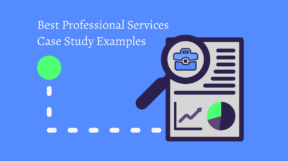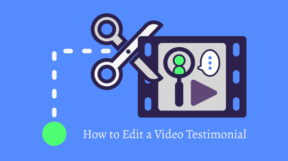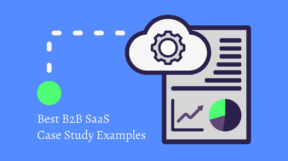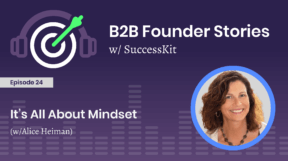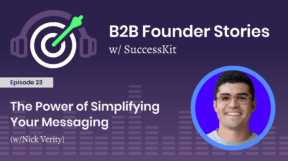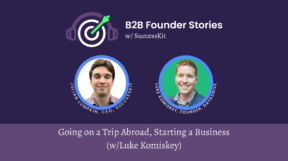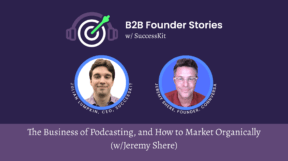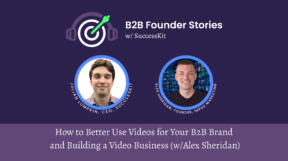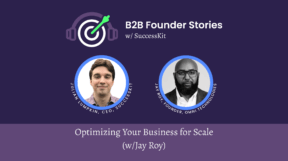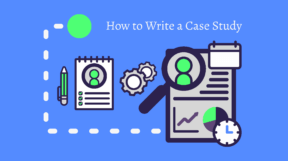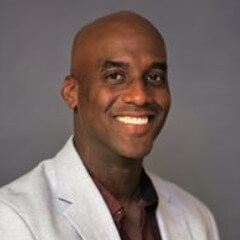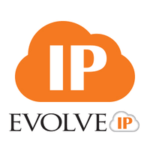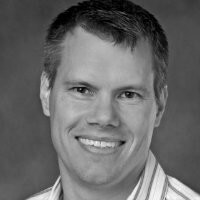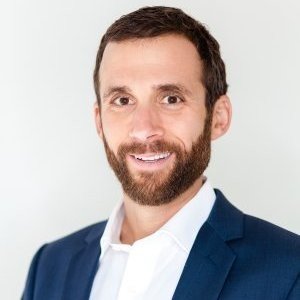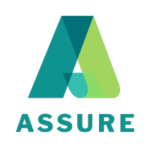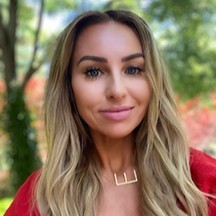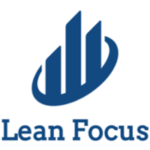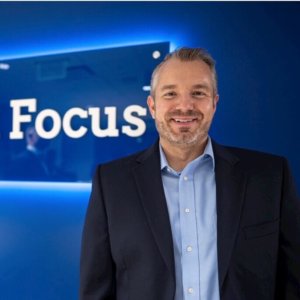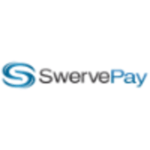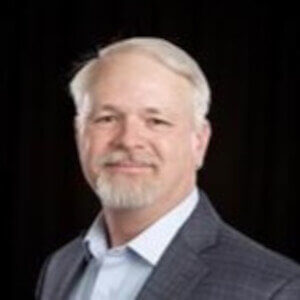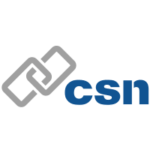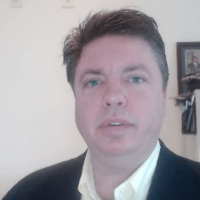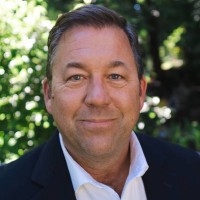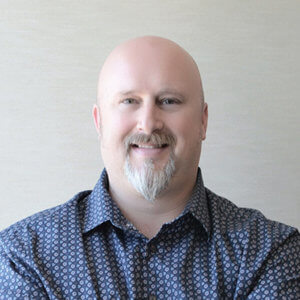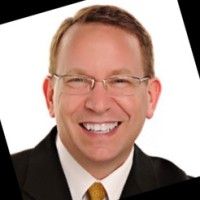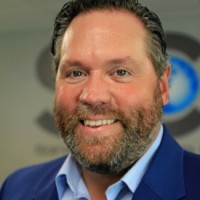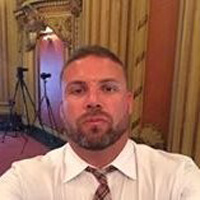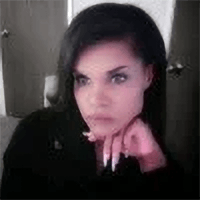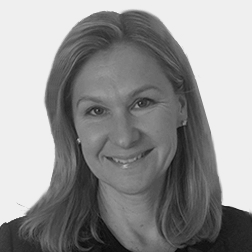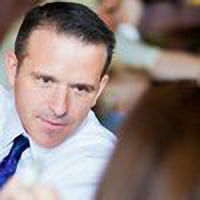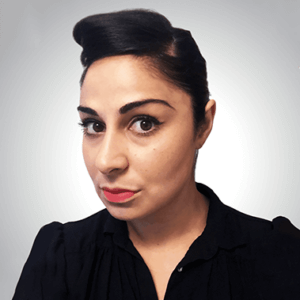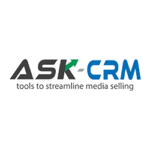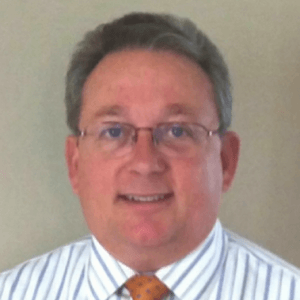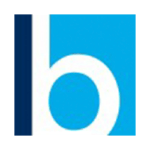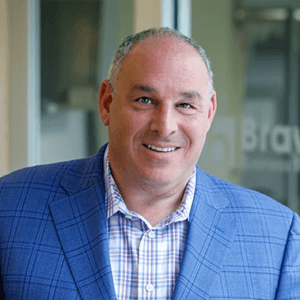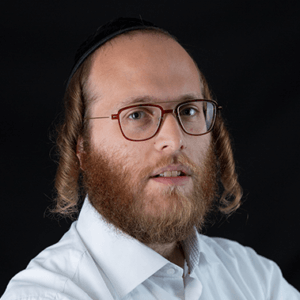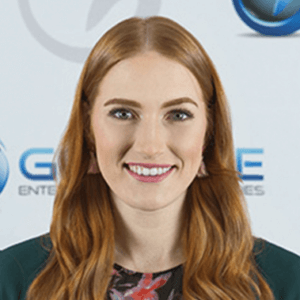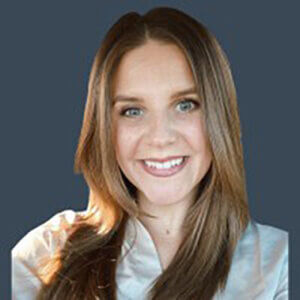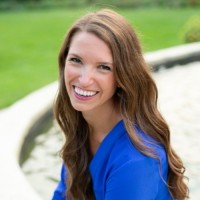Listen to this episode now on Spotify or Apple!
Kelsey Raymond, cofounder and CEO of the content marketing agency Influence & Co., drops by B2B Founder Stories podcast for its twelfth episode. She talks about running a small marketing agency in college as well as a co-working space, and how these experiences led to creating a business from scratch in the marketing world at age twenty-two. She also reflects on her biggest professional career mistake, the challenges of growing the business, and how one doesn’t have to be a visionary to succeed.
“A lot of people think that to be an entrepreneur you have to be the big visionary, the big ideas person. In my career, I’ve very much so been the operator and the executor, and partnered with people with the big ideas. I just think that’s people should know you don’t always have to be the big idea person to be an entrepreneur.”
Kelsey Raymond, Cofounder and CEO of Influence & Co.
Transcript of Podcast Episode 12: Co-Working to Cofounding (w/Kelsey Raymond, Cofounder and CEO of Influence & Co.)
Julian Lumpkin: Welcome back to B2B Founder Stories w/ SuccessKit. My guest today is Kelsey Raymond. She is the cofounder and CEO of Influence & Co. We discuss her founder story, beginning with running a small marketing agency in college, running a co-working space after school, and how these experiences led to her creating a marketing agency at the age of twenty-two. We talk about how she turned that firm into a success, such that she was able to buy out her partners and eventually sell a stake in the business while continuing to grow it, which she still does today. She also reflects on her biggest professional career mistake, the challenge of growing an agency, and her perspective on how one does not need to be a visionary in order to succeed as an entrepreneur. I hope you enjoy the conversation as much as I did. Kelsey, thank you so much for joining us.
Kelsey Raymond: Thanks for having me. I’m excited to get to chat with you today.
Julian Lumpkin: Great. So to begin, in your own words, tell us a little bit about Influence & Co.
Kelsey Raymond: Yeah, Influence & Co. is a content marketing agency. We specialize in helping our clients fuel their business growth through all online content. So that means we handle everything from clients’ blog posts and onsite content, optimizing all of it for search. But then we also do everything like white papers, infographics, newsletters, all the nurture content. And then where we’re a little different than a lot of traditional content marketing agencies is that we really specialize in earned media. So helping our clients get articles published in different online publications authored by them as subject matter experts, and also getting our clients mentioned in the media that their target audience is reading when journalists are writing about them, more from a PR standpoint. So we’re really full-service PR, but I think our differentiation point is that earned media component.
Julian Lumpkin: Great. And we’re going to spend most of the time today talking about how you got to this point, but can you give our audience a quick idea of the size of your company and the stage that you’re at now?
Kelsey Raymond: Absolutely. We are just about 11 years old, so we started in 2011. We are about 60 full-time employees and then we work with some part-time employees and contractors. Our team is located mostly in Missouri, but we are fully remote as of March of 2020, like a lot of the rest of the world. And as of February of 2022, myself and my co-founder, Alyssa, actually sold our majority stake in the company to become part of this collective called Intero Digital. We’re still running it day to day. Very much, this is my baby and I’m keeping it going, but that’s been a really interesting and fun new challenge to get to work with and join these other divisions of Intero.
Julian Lumpkin: Awesome. Well, as I mentioned, before we started recording, I own a very small marketing agency that came at things from a very different angle, so I think we’re going to have a really interesting conversation. And I really want to go back to why you started the company. Actually, before you tell us why you started the company, if you would, can you tell us what you were doing professionally before you started Influence and Co.?
Kelsey Raymond: Absolutely. When I started Influence and Co., I had started and launched, with other partners, a co-working space in Columbia, Missouri. This was back in 2011, so co-working was not as well-known and prevalent as it is today, WeWork was not around, the concept was very new. So it was a very unique challenge getting to start a co-working space when no one knew what co-working was. But I also had just graduated college. I actually started getting the co-working space off the ground during my senior year, and was told by the person who really was the funding behind it if I could get it up and running by the time I graduated, I had the job running it.
Then, a couple days after graduating, talked to that same person who was my employer at the time, and he said, “I have an idea for this type of marketing company that I think is new and unique. You majored in marketing, maybe you have some thoughts on this.” And he really, his name was Brent, Brent was really the one that had the idea for what would eventually become Influence and Co., which I think is always important to share because a lot of people think that to be an entrepreneur you have to be the big visionary, the big ideas person. And in my career, I’ve very much so been the operator and the executor, and partnered with people with the big ideas. So I just think that’s people should know you don’t always have to be the big idea person to be an entrepreneur.
Julian Lumpkin: That’s really interesting. Can you tell us a little bit more about what that conversation was like? So you were running a coworking space, how did it get from that to Brent bringing in this idea for a marketing agency and you ready to go all in on that?
Kelsey Raymond: Yeah, so I had actually run a very, very small three-person marketing agency while I was in college. So I had already had the experience of starting something from scratch in the marketing world, so I think that’s why he trusted me to come and say, “Hey, what are your thoughts on this?” And as we started discussing it, and what Brent really said is, “I feel like there has to be a way for entrepreneurs who are not going to get covered by the press, who are in industries where education and trust is really important, to be able to share their areas of expertise with their target audience as a way to nurture, engage and ultimately drive the leads.” We didn’t use the term content marketing because neither of us even knew that that was an industry back in 2011. And so Brent came to me and said, “I have this idea, I don’t have any time to work on it.” And I said, “Well, running the co-working space is actually not that challenging, so I would love to work on this on the side.”
So I started running the co-working space during the day, starting to try to figure out how we could get some exposure and get articles published for people in the evenings, and then very quickly went back to Brent and said, “There’s something here. I think we can turn this into a full-fledged company. Can we hire someone else to do my co-working job responsibilities and go all in on this?” So it was a pretty quick probably three months of me testing the idea out on the side before we said, “Okay, yeah, I need to focus on this full time.”
Julian Lumpkin: Interesting. And what did that test entail? How did you test that?
Kelsey Raymond: Yeah, so the biggest thing that we needed to validate was two sides. One, would this be valuable to business owners because so at the time we were only focused on one service line, which was getting op-ed articles published from business owners published into online publications that their target audience was already reading. So it was not at all everything that Influence and Co. does now, it was one single service line. So I wanted to validate would this actually be valuable to business owners? And on the other side, would publications actually publish content that’s not sponsored like advertorial content? How many publications were accepting guest posts and could we do it in a way that was valuable to their audience? And so to do that, I basically created the service and offered it for free to four business owners to say, “Let me see if this just works.” And we were able to get each of them published a couple of times.
They were sharing them on their LinkedIn, they had people reaching out to them that had read the articles, and the publications were coming back to me saying, “Do you have any other clients that want to contribute here? Because those articles were fantastic.” So it was a very small sample size, but that was the whole goal was just to basically do the MVP, like, “Can we do this on the smallest scale possible?” And if it works, then figure out, “Okay, how do we turn this into a business?”
Julian Lumpkin: Yeah, it’s really interesting to me that you use the term MVP because it’s a term that you most typically hear with technology companies.
Kelsey Raymond: Yep.
Julian Lumpkin: And one of the reasons I’ve personally enjoyed running a services business is that you can try and test things very quickly. There’s no code to write, you can just start offering the service. Sounds like you did it for free to really just find out whether, basically, if I’m hearing you correctly, you just wanted to do the service itself as quickly as possible and then build a business around it.
Kelsey Raymond: Yes.
Julian Lumpkin: What were the initial goals and expectations when you started the company 11 years ago?
Kelsey Raymond: None. I mean, if we’re being honest, 11 years ago, I was 22. And I just thought, this is a really fun side project to be working on. And this is where I made my biggest professional career mistake in that, as I mentioned earlier, I was working for this guy, Brent, I was an employee of his with the co-working space. So when we first started working on this idea for what would become Influence and Co., I didn’t ask the right questions, I didn’t push the conversation for, “Hey, let’s figure out what the ownership breakdown is here,” “Let’s figure out if we need to bring in a different co-founder,” “What’s equity breakdown going to be?” because I was just excited to be getting to work on this, I thought it was fun. And so long story short, what ended up happening is seven years into the business, I had a very, very small ownership stake of something that I really felt I had built from day one and was doing the majority of the heavy lifting on running the business.
And so ended up taking on an SBA loan to buy out Brent and the other co-founder to become the full owner of the business. So I just share that because talking about expectations, we didn’t have any expectations. I didn’t think this was going to turn into a successful business, I didn’t think this was going to turn into 60 employees and millions of dollars in revenue and profit. So because I would didn’t have that foresight, I didn’t get everything in writing that I should have. And I share that because I think a lot of potentially other young entrepreneurs like myself who are right out of college, you can get excited about the idea of something and really like and trust the people that you’re working with and not really realize, no, you need to do that due diligence of getting everything in writing, having those conversations upfront because it’s much, much easier to have conversations about who’s going to share in the profits of the company to what percentage when there are no profits of the company.
Julian Lumpkin: I mean, that’s I’m imagining a pretty big step seven years into it to buy out the partners using personal loan no less, what made you decide to do that? Why were you so confident in the business? Can you walk us through that decision-making process?
Kelsey Raymond: Absolutely. So at that point, like I said, we’d been around seven years, so we had seven years of financial history for me to look at and say, “What has our trajectory been? How is this going?” And I really felt like there are things I want to do with the business. And for me, it was a lot around the team and team structure and policies and how much we’re paying people, that I just felt like there wasn’t complete alignment on with my other co-founders. And that if I wanted to make those changes, I needed to have that full control. And so what made me feel like it was the right time and the right decision was a few things going on. The one co-founder, Brent, he had the idea for the business and he was involved somewhat in the beginning, and he provided the funding for it, so absolutely he should have had some ownership, but he was not really involved past that first six months. And so he wasn’t really involved day to day regardless.
My other co-founder, John, at that time, had started being really open with me, which I appreciate, that there were other things that were taking his attention that he was excited about. He had a friend that was starting a different business that he might want to work on. And so we discussed, hey, if his heart wasn’t in Influence and Co. at the time, and mine really, really was still then it was a perfect time to figure out all of this so that I could really step up and take the company forward in the direction that I wanted to. So it was nerve-racking, especially, it was October of 2018, had to get a SBA loan, so I had to put our house on the line for collateral. And then COVID in 2020 hits, which I knew the financial history of the company, but I did not predict a global pandemic and what that would do to the business. So it was an interesting couple years of taking on full ownership, getting that big loan, and then immediately going into the pandemic.
Julian Lumpkin: Yeah. And some of the ownership structure and changes aside, just changing directions here a little bit, as far as scaling the business itself, what part of growing the business was harder or took a lot longer than you expected?
Kelsey Raymond: Yeah, that’s a really good question because I think the things that I assumed would be the hardest weren’t. So sales, finding customers, that actually wasn’t that difficult for us. Once we got our first few customers, then we got a partner who had a great network of people he could refer our way, then we started using our own services and getting tons of leads through our own inbound marketing. So that part was not the thing that was the most difficult. I think what was the most difficult for us was really, when we started to scale quickly, scaling leadership, because we went pretty quickly from 10 people to 30 people to 50 people. And the processes that you have in place for 10 people break at 30 people, and then it breaks again, at least it did for us at 50 people.
And so figuring out the right structure and getting people into the right leadership roles, to where not everyone in the organization was reporting directly to me, and we actually had other people over different departments, is something that’s just messy. And I’d say that it took the longest and it was the hardest, but it’s also the thing I think that has made us successful now that we do have really great leaders over different departments in the company, and we only have now four people that report directly to me, which is very different when we had 12 people reporting directly to me, which I think made me a bottleneck and made it hard to scale the company.
Julian Lumpkin: At what stage of the business did you start to bring in a level of management between yourself and the rest of the employees?
Kelsey Raymond: It was probably around 30 employees, but I think one key factor here is I didn’t bring in management from the outside, everyone was promoted from internally. And I know there’s a lot of different points of view on this, and I completely see the other side of it. At Influence and Co., I felt like we had people that had potential, that they got the culture, they got what we were trying to do and I trusted them. And if you remember from the beginning of the story, I was 22 when we started the business. So me thinking that someone else wasn’t ready for leadership because they were 24 at the time is ridiculous because I was in it that early on. But we did, we had a lot of people grow up in the organization and learn their management skills at Influence and Co., so that can create growing pains at times, for sure.
Julian Lumpkin: What was the area of the business that you felt or maybe still feel and still are that you’re really strong on, and either was an area you didn’t want to give up control over or one that you still perhaps do today?
Kelsey Raymond: Oh, that’s good. I don’t think there’s any area of the business that I am better at everyone else in the company than. I think that’s one of my strengths, is being able to hire people that are smarter than me. So I really do think that I’ve delegated so much because we have really brilliant people and I’m really grateful to get to learn from them. I am still fairly heavily involved in our hiring process, but I think that’s still the right decision. I don’t know that that’s a because I think I’m so good at it versus just to me, a professional services firm, the team is everything, the people are everything. And so even if my role is just to have the last conversation with them and talk about the company and talk about the vision, and get them excited about accepting an offer from us, I still think that having some part in the hiring process is really important.
Julian Lumpkin: Well, it makes sense. And it’s interesting that you described the way you started the company not as the visionary. And I think a lot of people, whether it’s knowing it themselves or getting outside advice, but founders of companies that are those more visionary types really struggle to do what you’ve done. And it sounds like it really turned into a strength because you were not super attached or feeling like the whole company was built around some magic or vision that you had, but instead focused on building the team around it. And if I’m hearing you correctly, that’s what really fueled your growth.
Kelsey Raymond: Absolutely. And I think an interesting perspective on that too is that, so I mentioned Brent earlier, the other co-founder that I basically recruited after that three-month sprint of figuring out if this could work as a guy named John. And when John and I were building the company together, we really separated our responsibilities, where I was all internally focused. I ran operations, I had managed all the people on the team, I dealt with clients, and John was all externally focused. He was doing partnerships, new sales, marketing. And so when John left the company, he really was more of the face of the company. And so for a year before that, before he was leaving, we were working on how do we create this marketing machine and this sales engine that is not reliant on John, because that’s what I think so many, especially agencies and professional services firms, struggle to scale because the founders, the only person doing sales or the business is just so reliant on that founder and their network.
And so I think one, having John and I both leading the company was helpful, but also we really put in the work to recreate what we were getting from him before he left the organization.
Julian Lumpkin: So you mentioned, and I might get the name wrong, you’ve joined a collective of marketing agencies, I think you said that it’s called Intero.
Kelsey Raymond: Yes, Intero Digital.
Julian Lumpkin: Sorry, I’m going to just repeat that question.
Kelsey Raymond: Yeah, you’re good.
Julian Lumpkin: So you mentioned you joined a collective of agencies recently. Can you tell us about that and what made you decide to do so?
Kelsey Raymond: Absolutely. So the company is called Intero Digital. And what made me make this decision, it was a decision between myself and Alyssa, who’s also a co-founder of mine, is that we had been approached probably a couple of times a week by business brokerages for the last few years asking if we were interested in selling. And my answer was always, “Nope, I just bought my other past co-founders out in 2018. I’m looking to grow this thing, I’m not looking to do anything else. We’re not looking to sell.” But the pandemic coinciding with the birth of my first child, I had my son Oliver in February of 2020, that was a really, really stressful time for the business and for me personally. And so going through that and having that fear of finances were not good. If we would have not made some tough decisions, we could have lost the business, we could have lost our house, it was a very stressful and scary time as an entrepreneur, really made me take a step back and readdress from a risk standpoint how risky I was willing to be.
And also think about what’s really in the best interest of our clients and our team members moving forward, and seeing that if we could sell, so we basically sold the majority stake, and myself and Alyssa are still owners, but we’re not the majority owners anymore of the business, and we’re still running operations day to day. But by being part of this collective, we could sell the majority stake, which allowed us to get the bank loan off of our backs, so de-risk from that standpoint. And then we also then opened up into this network of five other agencies with their awesome list of clients that we could be working on, with career opportunities for team members who were interested in moving into different facets of marketing, that this could be a good fit for the rest of our team. And for our current client base, we can now offer services in partnership with these other agencies that our clients were always asking us for, but that we just didn’t have the skill sets in house to do.
So I really had to get past my just mental block of, “No, I’m never going to sell, never going to sell, never going to sell,” because I had to really look at this opportunity through the vision of, “Does this make sense for me personally from a risk standpoint? Does it make sense for our team and does it make sense for our clients?” And when the answer to all of those were yes, it was a very easy decision.
Julian Lumpkin: Where do you see the future or what do you see in the future over the next few years for Influence and Co. now?
Kelsey Raymond: Yeah, so we’re still looking to grow a ton, and that’s where it’s exciting being part of Intero Digital. There’s a lot of growth opportunities with working with a lot of the different clients they have, and also we’re still always looking to grow our client list. The areas that we have put the most resources towards improving in our business in the last couple years have been around analytics and reporting. And that’s really where I want to see us lean further into because there’s a lot of content marketing agencies that can create a white paper for you or can create 10 blog posts, but we want to be able to go to clients and say, “This is all the content marketing work we did for you, and these are the leads it generated, or these are the new sales it drove.”
We really, really want to be focused on being that results-focused content marketing agency, so that we can draw that direct connection to ROI with our clients. And the services that we’ve added and the work that we’ve done on the analytics and reporting side, I think are very much moving us that direction. And that’s what I’m most excited about for the future because those are the most fun conversations to have with clients.
Julian Lumpkin: Awesome. For our last set of questions, I want to hone in on your advice to other aspiring entrepreneurs because your story is different from a lot of people and it seems like you have different perspectives on what it means to be a founder and what that means for your life and lifestyle and family. So I’ll start with just a very open-ended question, you can answer it however you see fit. What advice do you have to folks earlier in their twenties, some, but not a ton of experience, who may see a potential entrepreneurial opportunity, but there’s a whole lot of risk attached to it?
Kelsey Raymond: Yeah, I would say look at your personal situation and really think through if you’re willing to take that risk. Because when I was 22, heck yes I was. When we started this business, the salary I was paying myself was in the twenties. I was taking a risk because I didn’t have a mortgage, I didn’t have children, I didn’t have a spouse. If I completely failed, what would’ve happened is I would’ve moved in with my parents. I had that safety night and I also recognize that as coming from a place of privilege that my parents were in a situation that they would’ve had a room for me to come back and live with them. And so as a 22-year-old, think about is this is the best time for you to take that risk? For some people it is, for some people it isn’t. For me, I was way more willing to take a lot of risk in my early twenties than I am now in my early thirties. For some people, that may be opposite.
Julian Lumpkin: I actually moved in with my parents temporarily when I started my agency. So I know about taking advantage of that privilege, as you put it.
Kelsey Raymond: Yeah, absolutely.
Julian Lumpkin: Do you feel that it was inevitable that you were going to be an entrepreneur and start your own business, or do you feel that if things had gone differently, you could be a VP at some big company somewhere, and circumstances just pushed you into this? Or did you think that one way or another you were always going to want to start your own thing?
Kelsey Raymond: I did feel like, one way or another, I would always want to start my own thing. And that’s because I was starting businesses from the age of seven. I started a neighborhood newsletter that I sold to every single person in the neighborhood, I had a business that I sold pillows and bandanas for dogs. My mom joked that our neighbors probably hated me because I was at their door every single week trying to sell them something different. So I definitely had that entrepreneurial spirit from a young age. Then in college, I started two different businesses, that were both very much we knew that we were not going to do them after college, but we made money, I learned how to hire employees, I learned how to do sales, I learned how to get contracts together. So they were great experiences.
And that’s where, when I was in school, I was fortunate to get paired up with a couple mentors, and when I was thinking about what I wanted to do afterwards, I just kept telling them, “I don’t know what I want to do with my career, but I can’t go work for some big company. And so who do you know that I should be in touch with?” And that’s how I got in touch with Brent and helped him launch that co-working space. And so that would just be my other maybe advice to people in their early twenties is if you know that you want to be an entrepreneur, but you don’t have that great idea, find people who are entrepreneurs and ask if they will mentor you, or if you can do an apprenticeship with them. Because just being around those people and getting exposure into what that looks like will help you in whatever you do next.
Julian Lumpkin: That’s great. And I think you just sharing your story with people is helpful in itself and people listening to this. My final question, and you can keep this one pretty high level, not looking for all the details here, but what does a typical day look like for you now, running a 60-person agency?
Kelsey Raymond: Yeah, that’s a great question. Every single day is different, which I’m sure does not surprise you. But a typical day, I normally have at least one or two one-to-one meetings with a couple people on the team, I’m normally doing something that is touching sales or marketing at some point in the day. So a podcast interview like this or jumping on a sales call with a really good potential lead. I’m so sorry, construction just started outside, of course. And then other things that I’m doing, I’m still involved in the hiring process, sometimes I am getting on the phone with potential vendors that we might be working with, or talking to our HR person about we’re going into benefit renewal season right now. So it’s really thinking about all the different departments and aspects of the business, “Who needs my time today?” Every single day it looks a little bit different, but on a monthly basis it all shakes out.
Julian Lumpkin: Well, we are over the allotted time now. I could probably keep going with questions all day, but thank you so much for coming on. It was great to hear your story here.
Kelsey Raymond: Thank you, this was fun.
Julian Lumpkin: Thanks for listening. I hope you enjoyed the interview. Stay tuned for our next episode coming soon, and as always, if you need help with your Case Studies, visit us at successkit.io.
Conclusion
Subscribe to the B2B Founder Stories podcast on Spotify and Apple and never miss an episode!
If you have an idea for a future topic you’d like addressed or if you’d like to be a guest on the series, contact Julian via the form on our Learn More page.
![Featured image for the post titled "Co-Working to Cofounding (w/Kelsey Raymond) [PODCAST]"](https://successkit.io/wp-content/uploads/2022/10/successkit-podcast-episode-12-kelsey-raymond.png)



